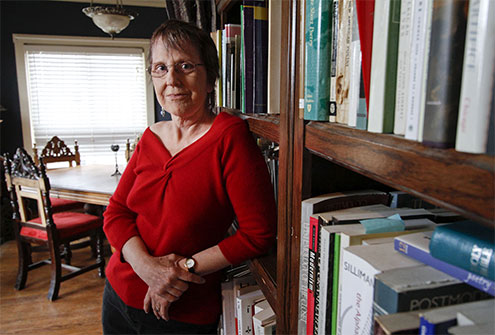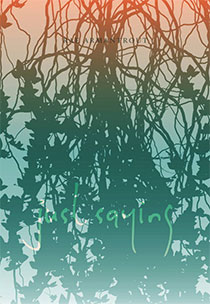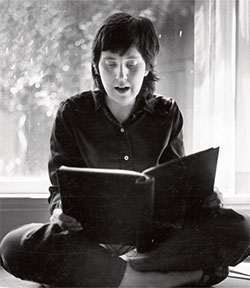by Rachel Howard
Rae Armantrout (M.A. ,'75), who won the Pulitzer Prize and the National Book Critics Circle Award for her collection "Versed" in 2010, recently released her fourteenth book of poetry, "Just Saying" (Wesleyan University Press). Gentle in voice and demeanor but formidably brainy, Armantrout has been described by The New Yorker as one of the "best" among the Language poets, a movement that began in the 1970s with Armantrout at its core. She spoke to her alma mater from her home in San Diego, where she teaches poetry at the University of California.

AP Photo by Denis Poroy
In the title poem of your recent collection, "Just Saying," you describe ivy as "insolent and tense." Why did you choose those words?
Outside my back window I could see ivy beginning to come over a wall. It was intruding into our space -- ivy is kind of aggressive that way, as well as being attractive. So I started by describing the visual cues of the ivy with both its heartshaped and pointed leaves and its tendency to grow in a line. It throws its tendrils across the top of a wall and then the leaves hang down and that reminded me of handwriting, almost cursive writing. From there, I started to think about my own writing, sitting with notebook in hand as I often do in the morning. I started to make parallels between the ivy's shape and persistence.
Reviewing your work in The New Yorker, Dan Chiasson wrote, "Armantrout generally writes in tautened distress, even when she's being funny." Does that resonate with you?
Well, I like "tautened." Maybe that is what attracted me to the ivy vine. I certainly like my poems to be taut and alert. If I resist any part of that description, it's the word "distressed." Sometimes I do write about what bothers me, but it's not always that. Somehow the word "distressed" sounds a little, I don't know, weak or something. But I often write about what puzzles me, sometimes what angers me, sometimes what excites me. It doesn't have to be distress.

You frequently pair something from contemporary human culture with an image from nature. In the poems in "Just Saying" images of branches and vines without leaves recur. That's also the image on the cover, some kind of vine.
I asked for "something vegetal."
How was that the image that stayed with you from the collection?
I was thinking of the title poem, "Just Saying," and the parallel it makes between the way a plant grows another leaf and the way I write another poem. There's something obsessive about it. What I like about the title is the double-meaning. The popular phrase, "just saying," is a way of discounting, you know, "I'm only saying," "don't take offense." "Your hair's a little messy, I'm just saying." But I also meant, these are only words, I'm going to keep writing them, the same way those plants are going to keep producing leaves.
I'd like to talk about the way that culture enters your poems. "Elements of Blank" seems to contain cultural critique, but I get the sense you don't go looking for things.
Sometimes I go looking in the sense that I carry a notebook, but I wait for things
to find me. In "Elements of Blank," the first three sections are quotes from a conversation I heard on a patio at Starbucks between two kitchen remodel salesmen: "You're not selling the product, / you're selling commitment." "Get them to opt out / of what's available / apart from the experience / of our product." Those were both quotes. And then the second part is a magazine cover I saw. In both cases, I had a strong reaction, especially to the salesmen's conversation, which was so obnoxious it just had to go in a poem.
Some writers have a sense of themselves as consuming culture in order to think about it, and other writers are wary of letting mainstream culture permeate their consciousness. Do you watch TV, co-exist or screen it out?
I do watch TV at night if I don't have anything else to do. I listen to the radio, and I'm on the Internet, looking at magazines. If you live in a city, it's hard to tune it out totally. And you can choose not to deal with that in writing or you can choose to react to it. In my case, it's not that I choose to react to it, it's that I have a reaction. There are poems in "Just Saying" that are not just about plants but about clouds, nature and about what I read. But I don't censor any part of my experience, so it could be a song on the radio or something from a commercial. I like to mix it up and see how these things talk to each other because I think they're part of our present moment.

Photo by Becky Cohen
After attending UC Berkeley, where you met Denise Levertov and other important figures in the group that we now call the Language poets, you enrolled in the master's program at SF State.
SF State was the only place I applied. It was 1972, the heyday of second-wind feminism, a lot of that in the air. I took classes with Stan Rice and Mark Linenthal. Mark sent a couple of my poems to George Oppen, who was a hero of mine, and whom he knew personally. I got a nice written response from Oppen, which was a thrill, of course. Kathleen Fraser was another very supportive influence. In the early to mid-1970s, a lot of people were writing poems narrating personal experiences, often grievances. It was the era of the post-confessional poem, and I was writing spare, minimalist poems. I got a certain amount of flak for that from other students in workshop. I distinctly remember talking to Kathleen about this in The Poetry Center. She said, "I don't think you need to worry about that."
Do you have a favorite poem from your new collection?
I like the first poem, "Scripture." It starts out with the violin, but then in the second section and continuing in the third section, I got into paraphrasing Biblical language. "Consider the hummingbirds / how they're gussied up." In the third section I'm still in that Sermon on the Mount voice, but I'm talking in the persona of a plant. My husband collects weird plants and is growing one called euphorbia. It has green flowers like a topknot, which I used in the poem: "Not one of you / with all your practice / is so extravagantly / coiffed." I like the way that messes with the Biblical language. But I also like speaking in the voice of this crazy plant. It's spring, and it's full of pollen, and it has this overflowing sexuality going on which is not what you'd hear in the Sermon on the Mount, but -- well, that's all I'll say about that.
The New Yorker review of your work characterized Language poets as believing that poetry can undo, "all the damage done to language by advertisers and politicians." Does that connect to your understanding of what Language poetry was or is?
I never heard anyone among us saying that. It sounds naïve to think that a poem could undo all the damage done to language for political and commercial manipulation. We can register that. We can make people more conscious of that, and that's one purpose poetry has -- to make the reader slow down and say, what did I just read, what did I just hear, and cause the reader, cause us all, to have a second look at something. I think that's what my poems are, a second look.